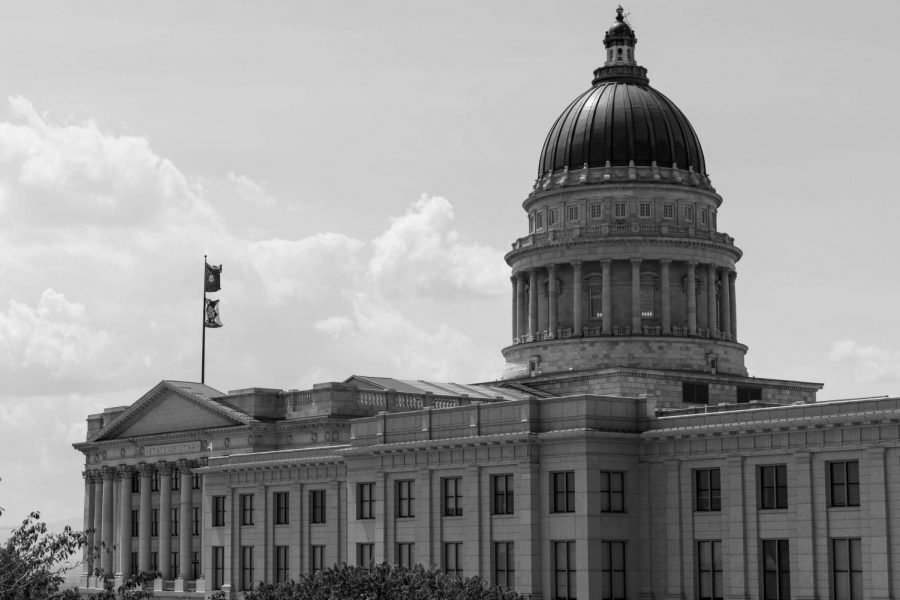Bringhurst: New Bill Is a Win for Affordable Housing
A view of the Utah State Capitol Building in Salt Lake City on Aug. 21, 2021. (Photo by Kevin Cody | The Daily Utah Chronicle)
March 9, 2022
Amid a housing crisis and on the last day of the legislative session, Utah legislators managed to pass a bill aimed to increase the state’s affordable housing. Homeowners and renters have been priced out of their homes. More than half of Utah’s households are “unable to afford the state’s median-priced home.” On Feb. 17, over 100 people were displaced from a homeless camp on the west side of Salt Lake City. Officials cited 45 new shelter beds as the reason for the abatement.
The House GOP pledged to align economic development incentives with housing needs during the 2022 legislative session. House Bill 462, an amendment to existing housing affordability legislation, could do just that.
H.B. 462 will increase affordable housing in Salt Lake City by placing limits on short-term rentals, enforcing zoning for moderate-income housing and prioritizing affordable housing around public transportation hubs.
Build Around Public Transportation
H.B. 462 recognizes the needs of low-income households by requiring cities to provide moderate-income housing within a one-mile radius of public transportation hubs.
Many solutions directed at affordable housing in Utah fail or are inadequate because legislators aren’t familiar with the needs of renters, especially low-income renters. Lawmakers throw money at the issue to see what sticks. But without the needs of low-income households in mind, the bills are ineffective.
Gov. Spencer Cox recommended allocating $128 million toward affordable housing projects. When it came to legislation, only $70 million was approved. Legislators claimed to prioritize affordable housing during the legislative session, but actions speak louder than words. While tax cuts for wealthy Utahns passed early in the session, advocates for low-income Utahns were dismayed to see the affordable housing budget shrink.
H.B. 462 may be the only piece of legislation this year that approaches affordable housing in a thoughtful way. It would direct communities to build and maintain affordable housing around transportation hubs, including Trax, FrontRunner and bus stations. Recognizing transportation as an important aspect of low-income lives is a critical step toward improving the lives of those who rely on low-income housing.
Beneficial Limits on Short-Term Rentals
The amendment takes an important stance on short-term housing rentals through sites like Airbnb and Vrbo. Short-term housing rentals grew in popularity with Utah landlords over the last few years, which is good for tourists and harmful for Utah renters.
Some landlords discovered that short-term rentals through sites like Airbnb are more lucrative and less constrictive than long-term affordable housing. They sell their rental properties as Airbnbs instead of low to moderate-income properties.
Many of the short-term rentals listed online are already illegal due to zoning laws, but cities were restricted from investigating unless they received noise complaints. Now, cities will be expected to enforce zoning laws, opening up new rentals to Utahns.
Enforces Zoning for Moderate-Income Housing
The House GOP’s plan recognizes that “Buying a home, raising a family or settling into retirement in Utah is a dream that is becoming out of reach for many.” This dream is no longer a reality because of the lack of enforced zoning for moderate-income housing.
Strict enforcement of zoning laws is a way to ensure availability of affordable housing. Currently, developers receive funds or property if they allocate a certain percentage of their property to affordable housing. Cities build new homes to keep up with Utah’s rapid growth rate, but many of the homes aren’t affordable for those who already live here.
H.B. 462 replaces incentives with enforcement. Rep. Steve Waldrip proposed strict zoning laws to enforce dedicated moderate-income housing. If passed, H.B. 462 will limit the construction of high-income housing in replacement of moderate-income housing.
A lack of moderate-income housing is straining the housing market. By increasing availability of middle housing, it should increase affordable housing for low-income residents in the long run.
Some affordable housing advocates expressed frustration in a lack of funding for affordable housing during the legislative session. They argue this bill isn’t doing enough, and I agree. This bill could have incorporated low-income housing into legislation or provided more funds to affordable housing groups. However, even though this bill doesn’t do as much as it could’ve for the housing crisis, it is a step in the right direction.








